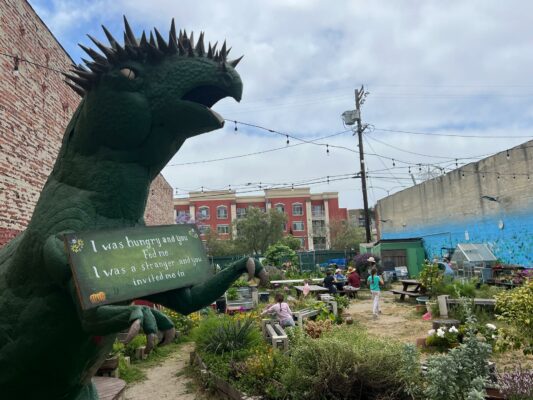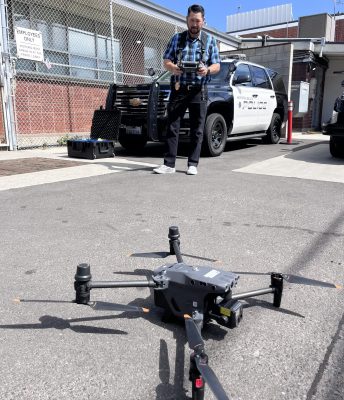by Kevin Cody
On June 21, 2013, two henchmen marched a quivering man with a black hood covering his head, onto a television studio soundstage in Cairo.
“As president Mohammed Morsi says, ‘Our country faces many conspiracies. There are many spies and secret agents. I am extremely delighted we could arrest one of them,” the smarmy talk show host told his audience.
Then the host ripped off the quivering man’s hood and announced, “Jon Stewart.” The delighted audience erupted in laughter.
The host was Bessem Youssef, whose inspiration for his weekly show, titled “The Show,” was Stewart’s “The Daily Show.”
Stewart had twice invited Youssef to New York, to appear on his show. He called Youssef his inspiration.
“Nothing I do gets me into the kind of trouble he gets into,” Stewart told Youssef’s studio audience.
The skit with the black hood was just a step removed from reality. Egyptian President Morsi had accused the CIA of enlisting Stewart to enlist Youssef to topple the Egyptian government with his satire. The satire moved still closer to reality when, three months after Stewart’s appearance on “The Show,” street protests triggered a military coup led by Morsi’s own minister of defense, General Abdul Fattah Al-Sisi. Many observers credited Youssef’s show with having mortally wounded President Morsi.
“The Show” averaged 40 million weekly viewers, in a country of 100 million. By comparison, the “Daily Show” averaged 2.5 million weekly viewers, in a country of 320 million.
Youssef was celebrated following President Morsi’s overthrow, but he did not celebrate. The government was back in the hands of the military, he pointed out to his TV crew during filming of “Tickling Giants,” a documentary about “The Show.”
Youssef’s concerns were validated following Sisi’s presidential election in June 2014 (with 97 percent of the vote). Protesters calling for Youssef’s death for satirizing Sisi began forming each morning outside his television studio. His producer’s father and brother were arrested. “Tickling Giants” shows the staff peeking through the studio’s closed blinds, wondering aloud how they were to leave the studio without being beaten.
In June, 2014, four episodes after Sisi’s election, the Middle East’s first and last political satire television show was forced off the air.
“We prefer to end the show, rather than betray our audience,” Youssef said in his final monologue. His station boss had told him, “The Show” could continue, but there could be no political satire.
Youssef was subsequently convicted of failing to fulfil his television contract, and ordered to pay his station $50 million.
Upon hearing the verdict, his attorney told him to flee, immediately, before he showed up on the No Fly List. Four hours later he was on a flight to Kuwait.

Act 3
Youssef now lives in Redondo Beach with his wife and young daughter, where, as he put it during a recent interview, “I am reinventing my life for the third time.”
He was a heart surgeon prior to becoming the Jon Stewart of Egypt.
Now, he is a stand-up comedian. He recently worked out new material at the Magical Bloom, a florist shop in Redondo, owned by his friend Jenny Barker.
This Friday and Saturday, (June 25 and 26) he will perform at the Improv Brea, in Brea.
“Yes, I was big in Egypt, but now I need to find my foothold here, and this is a very competitive place. It’s difficult with a different language, and a different audience. But America is all about second chances, right?” he said.
Youssef attributes his success in Cairo to the key to all comedic success — timing. “There was a brief grace period for political satire,” he explained.
The grace period opened January 25, 2011, when the Arab Spring that began a month earlier in Tunisia, spread across North Africa, to Egypt. There were 18 days of protest in Tahrir Square, in downtown Cairo. Heart surgeon Youssef volunteered at a field hospital set up in the square to treat injured protesters. When the government-controlled news reported the protestors were being paid with buckets of Kentucky Fried Chicken, he thought of his idol John Stewart.
He and YouTube producer Tarek Azaz set up a studio in his home laundry room.
“We hoped for 10,000 viewers. We got one million,” he said.
At the end of the 18-day protest, Hosni Mubarak, Egypt’s dictatorial president for the preceding three decades, was deposed by a military coup (not to be confused with the military coup that deposed President Morsi, one year later.) The new military leaders promised free elections and free speech.

An Egyptian television station, attracted by the size of Youssef’s YouTube audience, and the promise of free speech, offered him a weekly show. He signed the television contract the day his B1 work visa arrived for a fellowship in pediatric heart surgery, in Cleveland.
“My mother only agreed to my turning down the fellowship if I continued to work as a heart surgeon while I did the show. In the hospital kids would say to my patients, Pappa, that’s the funny man on television. Pappa would say, ‘Oh my god. He’s not going to operate on me, is he.”
In June, 2012, Muslim Brotherhood candidate Mohammed Morsi became Egypt’s first democratically elected president. Morsi’s brief honeymoon period with “The Show” and the Egyptian public ended when he dissolved the legislature and proposed an Islamic constitution.
Youssef was arrested after a skit in which he wore a comically large hat, mocking the hat Morsi wore while receiving an honorary doctorate. He was questioned for eight hours about what his jokes meant.
It was a form of torture he said, because comedians hate explaining their jokes.
When he was released on bail, he thought, “I’m invincible, they can’t touch me.”
But the satirical grace period ended when General Sisi overthrew President Morsi.
Despite what Youssef may have contributed to Morsi’s overthrow, the general was not a fan of “The Show.”
He took particular offense at an opening monologue in which Youssef characterized Sisi winning 97 percent vote to being “tighter than expected,” and to a skit in which a baker menace’s him for buying just one cookie with Sisi’s image, and not all dozen.
“Military leaders rule by fear. If they tolerate ridicule, it means the people are not afraid of them,” Youssef said.
Good morning America
When Youssef landed in the U.S., in 2016, timing served him well, once again.
“The first news I heard when I landed was Trump was leading in the Republican primary,” he recalled.
Fusion TV assigned him to cover the Republican National Convention, in Cincinnati.
Trump’s convention performance reminded him of home. “I had fled one dictatorship for another,” he recalled thinking.
But the speaker who followed Trump frightened him far more, so much so he left the convention hall fearing he might be attacked.
“For the first 15 minutes this man said the most horrible things about Muslims. Then he changed the narrative. He said there is nothing to fear about the majority of Muslims. They are often victims themselves. Pew Research found only nine percent of Pakistani Muslims support ISIS. Most are peaceful. But unfortunately, nine percent is 16 million people.”
The speaker was former Speaker of the House of Representatives Newt Gingrich.
“Think of someone offering you a bowl of M&Ms. Most of them are wonderful, but one is poisonous,” Youssef said.
“The rhetoric was the same as where I come from. Everyone was living in their own echo chamber. Ideology was more important than facts.”
A six week residency in stand-up at the Joe’s Pub in New York followed.
“I bombed a lot early,” he acknowledged.
“I’d like you to be gentle in case I bomb,” he pleads at the start of a 2017 performance at Meltdown Comics, a comic book store in Hollywood.
Two years later, in an hour long performance, recorded on YouTube, he kills, while comparing and contrasting (more often comparing) his adopted, and his abandoned countries.
He empathizes with American soldiers who return from Middle East wars with Post Traumatic Stress Syndrome, because, he explains, his entire nation suffers from PTSD.
Maybe, instead of military aid, the U.S. should send psychological aid, he suggests.
“Hello, this is Suicide Bomber Help Line. How long have you wanted to blow yourself up in the name of Allah?
“Uh, 10…”
“That’s 10 days? 10 week? 10 Months?
“Uh, nine, uh eight, seven six….”
He recalls a business lunch that was going well until everyone’s cell phone flashed news of a bombing, a few blocks away.
“The Americans at the table responded perfectly naturally. They said they hoped no one was hurt.
“My response was also perfectly natural. I thought, What’s the bomber’s name? Please don’t tell me it’s Mohammed. When we heard the bomb was a pressure cooker, I relaxed. Muslim men don’t cook.”
Youssef has declined offers to resume his show under President Sisi (who was reelected in 2018, again with 97 percent of the vote) because he knows he would be censored. And then used to give Sisi’s government legitimacy.
“Satire that doesn’t deal with everyday realities isn’t satire. It’s a distraction. If all you talk about are the problems with traffic and the bureaucracy you are betraying your audience,” he said.
“The Show” left him with a humbling understanding of satire’s limitations.
“Satire doesn’t save anyone. It’s a starting point. If people use satire as just a catharsis, it’s not going to make a difference.”
Protests, too are only a starting point, he noted.
“Protesters treated the Arab Spring like an Instagram event. But revolutions take more than chanting and singing in the town square. They don’t happen in 18 days. The revolution never took control. The true rulers remained the military,” Youssef said.
He pointed to the centuries it took the West to evolve from theocracies, to monarchies, to democracies. In the Middle East, he hopes that process will be compressed into decades.
A healthy outlook
Unlike his satire, Youssef believes another project he has undertaken can bring rapid, lifesaving change in the Middle East.
Based on his medical training and as an Arab vegan (“I’m scary and annoying”) he has developed the app- and website-based PlantB.TV. to address chronic illnesses, such as hypertension, heart disease, and diabetes.
In the Middle East, 75 percent of people are overweight, nine percent have diabetes and 50 percent of deaths are from heart disease. PlantB offers “whole food, plant-based” recipes and advice on healthy living.
Youssef is the author of “Revolution for Dummies: Laughing through the Arab Spring,” (available on Amazon Audible), and “The Magical Reality of Nadia,” the first in a series of children’s books, published by Scholastic, about a immigrant child who uses her magical powers to confront intolerance.
For more about Youssef’s “The Show,” visit.bassemyoussef.xyz
For more about Plant B, visit PlantB.TV.
“Tickling Giants” is available for viewing on Amazon Video.
Tickets to Bassem Youssef’s performance this Friday and Saturday, June 25 and 26, at Improv Brea are available at Improv.com/Brea. ER










